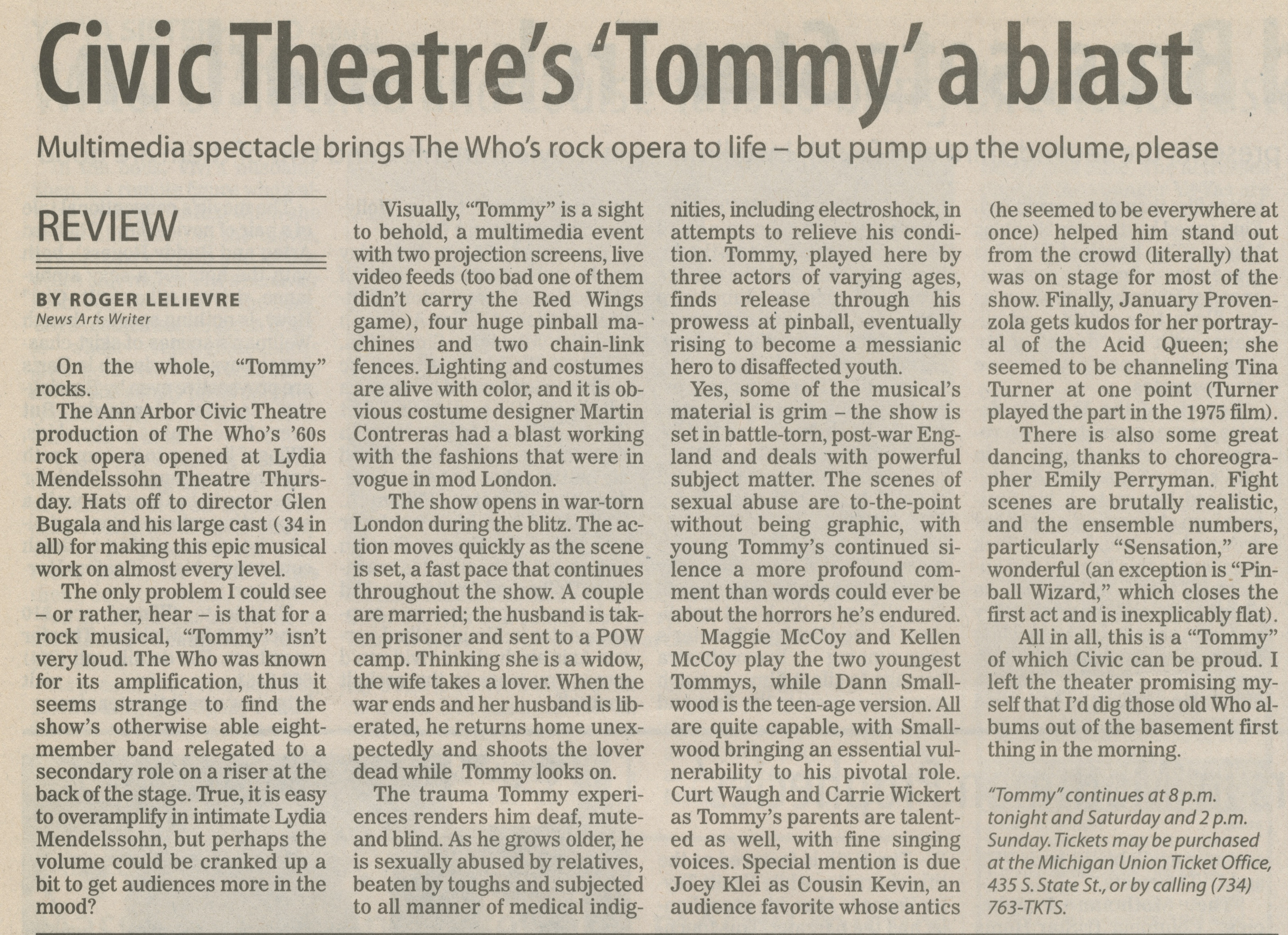Civic Theatre's 'Tommy' A Blast

Civic Theatre's 'Tommy' a blast
Multimedia spectacle brings The Who's rock opera to life - but pump up the volume, please
REVIEW
BY ROGER LEUEVRE
News Arts Writer
On the whole, “Tommy” rocks.
The Ann Arbor Civic Theatre production of The Who’s ’60s rock opera opened at Lydia Mendelssohn Theatre Thursday. Hats off to director Glen Bugala and his large cast (34 in all) for making this epic musical work on almost every level.
The only problem I could see - or rather, hear - is that for a rock musical, “Tommy” isn’t very loud. The Who was known for its amplification, thus it seems strange to find the show’s otherwise able eight-member band relegated to a secondary role on a riser at the back of the stage. True, it is easy to overamplify in intimate Lydia Mendelssohn, but perhaps the volume could be cranked up a bit to get audiences more in the mood?
Visually, “Tommy” is a sight to behold, a multimedia event with two projection screens, live video feeds (too bad one of them didn’t carry the Red Wings game), four huge pinball machines and two chain-link fences. Lighting and costumes are alive with color, and it is obvious costume designer Martin Contreras had a blast working with the fashions that were in vogue in mod London.
The show opens in war-torn London during the blitz. The action moves quickly as the scene is set, a fast pace that continues throughout the show. A couple are married; the husband is taken prisoner and sent to a POW camp. Thinking she is a widow, the wife takes a lover. When the war ends and her husband is liberated, he returns home unexpectedly and shoots the lover dead while Tommy looks on.
The trauma Tommy experiences renders him deaf, mute-and blind. As he grows older, he is sexually abused by relatives, beaten by toughs and subjected to all manner of medical indignities, including electroshock, in attempts to relieve his condition. Tommy, played here by three actors of varying ages, finds release through his prowess at pinball, eventually rising to become a messianic hero to disaffected youth.
Yes, some of the musical’s material is grim - the show is set in battle-torn, post-war England and deals with powerful subject matter. The scenes of sexual abuse are to-the-point without being graphic, with young Tommy’s continued silence a more profound comment than words could ever be about the horrors he’s endured.
Maggie McCoy and Kellen McCoy play the two youngest Tommys, while Dann Smallwood is the teen-age version. All are quite capable, with Smallwood bringing an essential vulnerability to his pivotal role. Curt Waugh and Carrie Wickert as Tommy’s parents are talented as well, with fine singing voices. Special mention is due Joey Klei as Cousin Kevin, an audience favorite whose antics (he seemed to be everywhere at once) helped him stand out from the crowd (literally) that was on stage for most of the show. Finally, January Proven-zola gets kudos for her portrayal of the Acid Queen; she seemed to be channeling Tina Turner at one point (Turner played the part in the 1975 film).
There is also some great dancing, thanks to choreographer Emily Perryman. Fight scenes are brutally realistic, and the ensemble numbers, particularly “Sensation,” are wonderful (an exception is “Pinball Wizard,” which closes the first act and is inexplicably flat).
All in all, this is a “Tommy” of which Civic can be proud. I left the theater promising myself that I’d dig those old Who albums out of the basement first thing in the morning.
“Tommy"continues at 8 p.m. tonight and Saturday and 2 p.m. Sunday. Tickets may be purchased at the Michigan Union Ticket Office, 435 S. State St., or by calling (734) 763-TKTS.